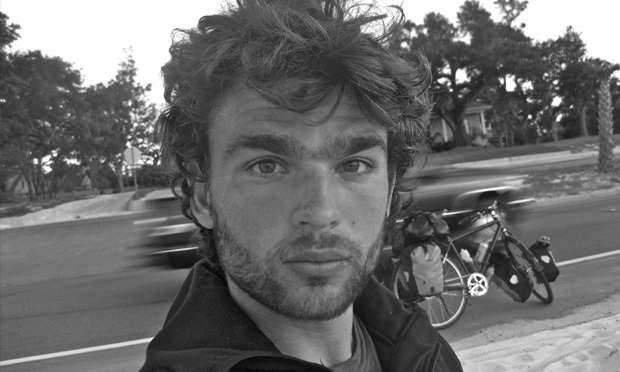On Message – writer and ex-bicycle courier pens memoir on wheels

Bicycle courier turned journalist and author, Julian Sayarer
As a bicycle courier, Julian Sayarer spent three years being a “tangible cog” in a world of multi-million pound contracts, greasing the wheels of the global economy.
When Lehman Brothers collapsed in 2008, he delivered the receivership notices to the bank in Canary Wharf, becoming a bit-part player in a major historical event.
“It shows the quite humanised absurdity of the world economy that the couriers get paid £7.50 to deliver three sets of notices on a £50 billion bail out,” he recalls wryly.
In his book Messengers, Sayarer, now a journalist and author living in Dalston, writes about being a cycle courier, transporting information from bank to law firm, learning London off by heart, and becoming intimately acquainted with kerbs, potholes and alleyways.
Sayarer first started couriering after finishing university and returning from a year living in Istanbul.
“You’re pedalling around London, sometimes coughing your guts up because of the air quality, or you’re sick but don’t get sick pay and so have to go to work anyway. But I was in my early 20s and on balance it was enjoyable, diving between gaps in traffic and hammering it hard across the city for your next delivery.”
In 2009, Sayarer broke a world record for cycling around the world, recounted in his first book Life Cycles. The previous record holder, Mark Beaumont, had the backing of corporate firms and sponsorship deals. So when Sayarer broke the record he not only stuck it to his arch-rival, but to the man too.
But returning to London, the victory began to seem hollow. A world-record on your CV doesn’t always help your job prospects, and soon Sayarer slipped back into cycle couriering.
Messengers is set around 2010-11, after Sayarer had returned from travelling, and the initial thrill of darting around London on two wheels had made way to misgivings about the future.
“There’s lots of notions of readjustment in it,” he says. “Cycling through Kazakhstan, you’d get people inviting you in to have tea in their yurt, and then you go back to the City, which is money motivated, fast-paced and frequently hostile – so there’s quite a lot of reflection on the nature of the modern city.”
The word “precarious” comes up more than once in our conversation, a word that describes the profession in several ways.
Before the dawn of email, a bicycle courier could eke out a living, but now couriers are among the ranks of the lowest earners. In return for risking their lives each day they are made to work as self-employed contractors – meaning no pension contributions, no sick leave and no holiday pay.
But despite the physical exhaustion, the poor pay and the lack of prospects, there is also camaraderie amongst cycle couriers, a subculture and sense of community that marks it out from other professions.
“It’s an urban community and it has its rituals. You have the alleycat racers who organise races where messengers will compete against each other, you’ve got the courier world championships held in places like Chicago, Warsaw and Lausanne where couriers from around the world would race.
In London, couriers would hang out at the former Foundry pub, which lay on the corner the junction of Old Street and Great Eastern Street.
“There’d always be a gathering of couriers out front drinking tinnies from the off-licence, which is probably one of the reasons why the pub couldn’t survive,” Sayarer reflects.
As more vital information is driven online, cycle couriers will only become less needed and it might not be long before the profession disappears completely.
Sayarer tells me that when he was a courier, colleagues and friends would be able to get by through living in a squat – something no longer viable since squatting a residential building has been criminalised.
“It’s a genuine community that’ll look after people who maybe are a little rough around the edges but still have that right and need of a community, and I think the modern city is squeezing people out of space for that sort of thing,” he says.
A time came for Sayarer when the thrill of careering through traffic gave way to a fear of doing it for the rest of his life. Now 30, he can look back at couriering as a chapter of his life that has come to a close.
However, he is aware that not everyone doing the job has that luxury.
“It’s all well and good having this social tourism and saying this is a job with a shelf life and eventually you get out because it’s hard,” he says.
“But you need to talk about the people who don’t get out of that job, who are going to do it for the rest of their working lives and never manage to get the breaks to move on.
“I think it’s something I would have always wanted this book to bring out.”
Messengers: City Tales from a London Bicycle Courier is published by Arcadia Books.
RRP: £8.99 ISBN: 9781910050767
Julian Sayerer will be reading from Messengers on 7th April at Pages of Hackney
pagesofhackney.co.uk
